Film BA(Hons)
A Film degree for future filmmakers.
Course overview
This course will be re-named to BA(Hons) Filmmaking for all new students from September 2027.
On this industry-accredited Film degree, you'll learn to tell immersive stories through film. You'll hone your visual craft through hands-on experience, all in a specialist facility that mirrors real-world film production.
You'll explore the history and cultural contexts of film, alongside being given the creative freedom to make your own films; collaborating with other talented producers, writers, cinematographers and actors from across the University.
BA Film at Falmouth supports you to identify ideas, technologies and processes that challenge the norms of conventional filmmaking. This Film degree gives you the opportunity to explore a range of projects, including short- and long-form cinema, documentaries and more experimental indie filmmaking. You're encouraged from the start to try your hand at camera, post-production editing, grade, sound design, and screenwriting, before specialising in your chosen craft, and carving your own niche.
You will:
- Have the opportunity to work in-house through our production centre, the Sound/Image Cinema Lab. Previous productions include Film4’s Rose of Nevada (Mark Jenkin, 2025), Long Way Back (Simon Harvey, 2022) and Wilderness (Justin Doherty, 2021)
- Learn from award-winning staff and industry experts. Recent visiting professionals include Tom Morgan (Head of Client Services at ENVY Post), Ben Coren (Development Executive at Film4), and Johnie Burn (sound design for Nope, Zone of Interest)
- Build knowledge and skills through technical workshops and masterclasses led by film practitioners that mirror real industry’s practices
- Study on a Film course accredited by ScreenSkills, in a facility that’s part of CILECT and the ENVY Academy
This Film degree is industry recognised by ScreenSkills, the industry-led skills body for the UK's screen-based industries, and carries the ScreenSkills Select quality mark which indicates courses best suited to prepare students for a career in the screen industries.
From September 2027, this course will be renamed to BA(Hons) Filmmaking. All new first year students enrolling on the course from September 2027 onward will join the course with the new name. All existing students enrolled before September 2027 will retain the previous course title, BA(Hons) Film, throughout their studies.
Course details
On this Film degree, you'll have the opportunity to gain a BA(Hons) degree over three years or the option to study Film BA(Hons) with Integrated Foundation Year and/or a professional placement.
Working in multi-disciplinary teams, you’ll create work in a productive and collaborative environment that will ready you to be a dynamic professional in the workplace.
You'll understand how collaborating with others and honing your research skills can help broaden your own thinking and knowledge to give impact, relevance and reach to your creative work.
Our film school boasts ScreenSkills and CILECT accreditations, which are awarded to courses delivering the very best creative thinking, industry-relevant training, exceptional staff, facilities and partnerships.
The first year of your Film degree will focus on developing your film knowledge through lectures, seminars and screenings, as well as nurturing your talent in all areas of short film development and production. You’ll further your understanding of industrial and creative contexts by examining current filmmaking trends in form, style, theme and narrative. You’ll have the opportunity to network with experienced professionals through our series of panel discussions and masterclasses, helping to enhance your industry skills and employability profile. You’ll also have the chance to visit an international film festival.
Modules
Production Cultures 1
This module will introduce you to the creative, technical, organisational and interpersonal skills that are central to successful film production. A series of weekly tasks will develop your knowledge of the language of cinema, while encouraging networking within your cohort. You’ll begin to understand the key industry roles – writer, director, producer, cinematographer, editor and sound designer – needed to produce a short film.
Production Cultures 2
This module will extend the creative, technical, organisational and interpersonal skills developed in Production Cultures 1 to encompass budgeting, design, marketing and film distribution. You’ll also deepen your knowledge of production roles, paving the way for you to specialise in Year 2.
Cultural Contexts
In this module, you’ll consider the key moments and milestones of the development of film as an art form, industrial product and object of academic and critical study. This will prepare you for deeper cinematic research across your Film degree and develop your scholarly research and essay-writing skills.
Industrial Contexts
This module foregrounds a range of contexts, both historical and contemporary, to consider how industry, audience, and film texts are inextricably bound together in industry practice. You’ll collaborate with others to produce a presentation that highlights your research and communication skills.
You'll build on your interests and passions by embarking on specialist pathways of your choice, deploying the skills you learn in a self-initiated project – typically within screenwriting, experimental, documentary or narrative filmmaking. Each week is designed to focus your learning and cinematic knowledge in an environment that recognises and embraces the medium’s changing nature. We also offer the opportunity to engage in placements through a number of external partnerships and opportunities.
Modules
Skills Development
Identifying your own interests, you'll develop skills in a chosen specialism – sound design and editing, editing and post-production, producing, screenwriting or cinematography and art direction – and showcase your growing understanding of collaborative practice, professional processes and industry contexts.
Creative Delivery
Building on the Skills Development module, you’ll work to produce either a narrative film, documentary film, experimental film or screenwriting project for assessment.
Genre
This module aims to develop your understanding of the role genre plays in film industry and culture, both historically and contemporarily, and how the idea of 'the cinematic' is closely connected to genre and has spread in influence to other modes and forms of media entertainment.
Cinema of Experience
This module will inspire you by offering contemporary cinematic examples and conceptual frameworks to situate film and serial narrative/documentary forms in wider cultural, social, political and global contexts, such as gender, race, class and sexuality.
You can choose to take an optional professional placement after your second year on a three-year programme, or after your third year if you’re studying for a degree with an Integrated Foundation Year.
You’ll be responsible for finding your own placement, with support from the Employability team.
Choosing this option will enhance your industry experience and skills while studying.
How you’ll study during your professional placement
You’ll spend time working in a professional context, as part of a business or organisation. This can be in one role, or up to three, and must be for a minimum of 24 weeks.
You’ll develop in-demand workplace skills, deepen your insight into industry and grow your network of contacts, all of which could help you get ahead in your career after graduation.
Throughout this year, you’ll develop a portfolio of work that includes critical self-reflection on what has been learned from the experience. You’ll be required to evidence your experiences, the skills you’ve learned and your professional growth.
In filmmaking practice, you’ll immerse yourself in a year-long project of creative cinematic endeavor, where you will develop an ambitious and innovative piece of work that sits alongside your research. You’ll also produce a festival strategy or equivalent as well as build your professional profile to help launch your career after graduation. Alongside this, you’ll continue to explore the wider social, political, industrial and artistic contexts of film culture and cinema, choosing from a dedicated module examining the voices of The Other, and a dissertation in a cinematic subject area related to your interests. Each module results in a long-form piece of scholarly writing which will position you ideally for postgraduate studies.
Modules
Pitch Deck
Through this module, you'll become immersed in film practice. Assessment will reflect professional creative industry processes, contexts and cultures, resulting in an ambitious, innovative and complex cinematic project.
The Other (optional)
You’ll explore global cinematic practices which have traditionally sat outside the dominant film canon and popular culture. You’ll examine non-traditional screen representations to the evolution of cinematic storytelling techniques and the formal fashioning of film visuals. Starting from a historical perspective, you'll be invited to recognise cinema as a potent and flexible medium of expression and communication for all backgrounds and cultures.
Dissertation
Focusing on academic study, you'll develop high levels of subject expertise and intellectual autonomy as you originate, research, and write a dissertation in an area of your choice.
Final Major Project
You'll be immersed in film practice and assessment that reflects professional industry processes, contexts and cultures. You’ll carry out an ambitious, innovative and complex cinematic project that will help to springboard your career in the film, television and combined creative industries.
Futures
This module will help to prepare you for pursuing a career after graduation. You’ll be supported by the University’s Employability Team and a supervisor from the course to help build your professional profile.
Why study an Integrated Foundation Year route?
If you’re taking on a new subject that you haven’t studied in depth before, have been out of education for a while or have a non-standard educational background then an Integrated Foundation Year degree may be the right choice for you. It is a four-year degree with an Integrated Foundation Year to start, which allows you to explore the primary elements of your subject before progressing on to the remaining three years of the BA(Hons) degree.
What you'll learn
If you choose this pathway, you'll study five core modules in your Foundation year. These are all designed to help you explore the foundational elements of your subject. You'll gain relevant technical skills, learn to experiment and take risks, develop an understanding of professional practice, have opportunities to work across disciplines and collaborate with other students on live project briefs.
Modules
Explore
You'll begin your foundation year by working collaboratively with others to explore themes of the future. You'll take risks, experiment through play and be supported to break through barriers.
Technique
You'll take subject-specific workshops and develop essential technical and practical skills in your area of study. You'll also enhance your analytical and organisational abilities.
Apply
You'll work with your peer group to think beyond discipline by addressing a societal or global issue. You'll then showcase your work to your peers and deliver and accompanying evaluation of your process.
Industry
You'll enhance your creative and practical skills in your subject specialism by responding to typical industry briefs, underpinned by focused research and experiments. You'll also gain industry insights through guest lectures and workshops.
Launch
You'll develop your unique identity in your specialism through the production of a self-initiated body of work. Your final project will be the bridge to your next year, fully supported by evaluative reviews and critical analysis of the work you have created.
After the Foundation year, you progress into Year One of the full three-year degree, equipped with a deeper knowledge of your subject, a clear understanding of your strengths, and develop a practical and technical skillset and the confidence to excel in your chosen subject.
If you apply for and enrol onto a degree with an Integrated Foundation Year, you’ll have the option to switch onto a five-year version including a placement year. That means you’ll complete the first three years of your course before completing a placement in industry in your fourth year and returning to Falmouth for the fifth year of your programme.
The Integrated Foundation Year pathway for this course is new for entry year 2023 and subject to validation.
We regularly review course and module content to ensure our students receive a high-quality and rewarding academic experience. As such, there may be changes made to the curriculum which are not immediately reflected in the content displayed on our website. Optional modules may be updated to maintain the best experience. Any students or applicants affected will be informed of approved changes directly.
From module information to course aims and assessment criteria, discover the full course details:
Discover more from our School of Film & Television
Our accreditations
A CILECT School of Film and Television
We're part of the International Association of Film and Television Schools. This means you'll be part of a global network of interconnected film schools able to tap into equipment and expertise around the world.
ScreenSkills Select
As a ScreenSkills Select accredited course we ensure our degree prepares you for industry, equipping you with key skills employers are looking for, and gives you access to links with the local and national screen industry.


We are also certified, accredited or partners of the following industry-recognised bodies:
- AVID Training Partner
- Envy Academy Partner
- ARRI Certified Film School
- Kodak Educational Partner
- Albert Certification
- Production Guild of Great Britain
Offering students real industry opportunities
The Sound/Image Cinema Lab is a unique multifaceted teaching, research and film practice project that acts as a partner, resource and funder for Cornish and UK independent cinema of all forms and genres from within Falmouth University. Home to BAFTA winner BAIT (2018) and BIFA-winning Enys Men (2022), this collaborative lab gives students and graduates the opportunity to apply for work on film projects alongside our industry-practising staff.
Explore the Sound/Image Cinema Lab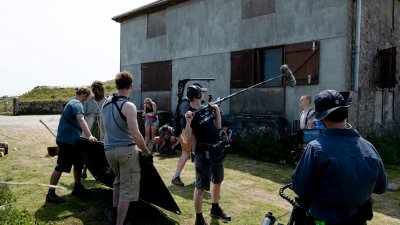
How you'll learn & be assessed
On this Film degree, you’ll learn through a series of lectures, seminars, bookable tutorials, and self and peer evaluation.
You’ll benefit from our School of Film & Television’s industry connections with a curated visiting lecturer programme, panel discussions, technical workshops and masterclasses with industry practitioners. Our learning by doing approach to the course means you’ll gain an understanding of your chosen sector and mirror the film industry’s workflow and creative environments.
Each year is also your chance to gain work experience and internships, and we'll encourage you to get involved in industry and academic opportunities and events.
At Falmouth, we use a 'digitally enhanced learning and teaching' approach. Your experience will always be predominantly in-person, including seminars, tutorials and studio teaching, with some, more targeted elements, being online either live (synchronous) or pre-recorded (asynchronous). You can read more here.
100% of your assessment will be coursework.
Assessment methods
- Continuous assessment with no formal examinations
- Visual, verbal and written assignments
- ‘Campfires’ (timetabled group drop-in sessions) and bookable one-to-one tutorials
- Optional dissertation in your final year

What's the difference between studying Film and Television?
Find out here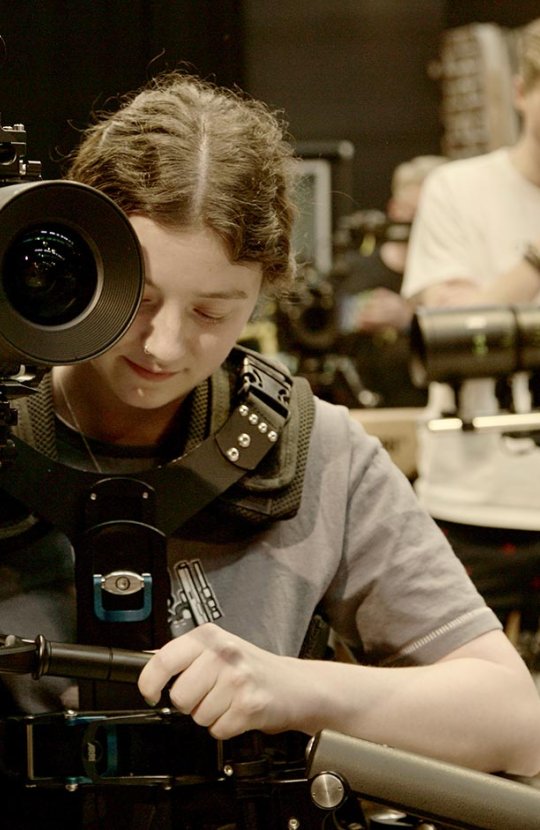
Virtual tour
Discover where you’ll spend your time as a student with our 360° tour, showcasing our facilities, accommodation, town and scenery.
Facilities
The School of Film & Television is situated in a dedicated building and features extensive production, post-production and facilities store.
- 129-seat cinema, with Christie M Series 2.5k projection and 7.2 surround sound.
- Four large production studios:
- Production Studio 1: multipurpose studio equipped with three Sony HXC-FB80 studio cameras, chromatte grey screen and full lighting rig. Integral live gallery including 4-input Tricaster Ultra HD production system.
- Production Studio 2: multipurpose studio and support area for studio 1.
- Production Studio 3: multipurpose studio with lighting rig.
- Production Studio 5: Specialist green screen studio with infinity cove & 360 degree subject lighting rig. Access to Xsens motion capture kit and VR/AR/MR equipment.
- Nine Mac Pro edit suites with Avid Media Composer, Adobe Creative Cloud Suite & Da Vinci Resolve.
- Two specialist grading suites featuring DaVinci Resolve and 4K preview screens.
- Two 28-seat ‘Post Hubs’ for post-production software training, equipped with dual screen Apple iMacs. Software available includes Avid Media Composer, Adobe Creative Cloud, Da Vinci resolve and Pro Tools. Avid NEXIS shared storage system for seamless access and integration of projects.
- 25-seat dubbing theatre with Avid S6 mixing desk and Pro Tools Ultimate. Foley/ADR suite with access to a wide range of mics, foley traps and props.
- Three further post-production audio suites – all equipped with Pro Tools Ultimate.
- Digital cameras (HD to 5K) including Arri Alexa, RED Gemini, Sony FX6, Canon C500 and XF305, and Arri SR3 and Bolex 16mm film cameras, plus Odyssey 7Q+ External Recorders.
- Wide range of hot and cold (LED) lighting equipment including systems by Arri, Dedo & Kino Flo alongside traditional blondes and red heads.
- Grip and gimbal systems available include DJI Ronin Gimbal systems, Wally Dolly, Indie Dolly, PD1 Dolly, Ronford Baker Sliders, Libec and Camcrane Jibs.
- Audio equipment includes Sound Devices 633 mixers, recorders and an extensive range of microphones.
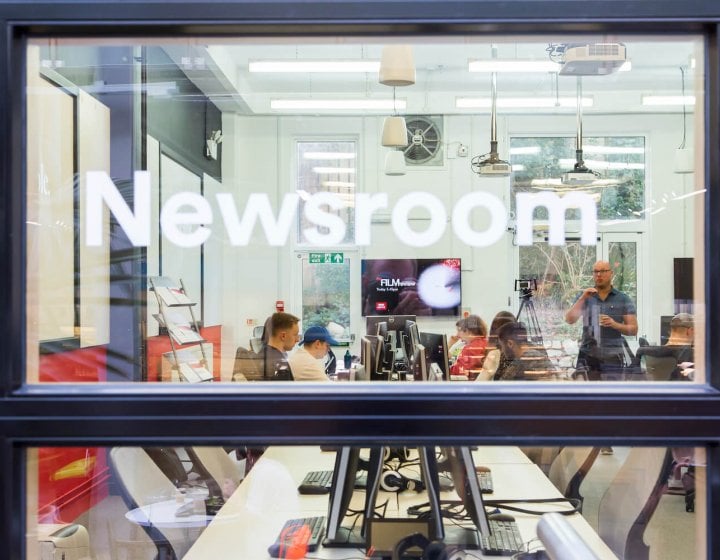
Media Equipment and Facilities
Our industry-level facilities offer everything you need to practice and produce animation, film, TV,...
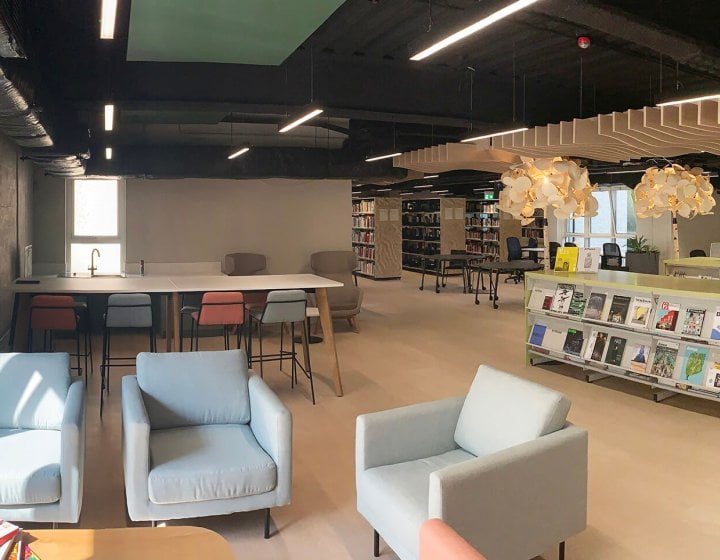
Library Facilities
Offering extensive collections, our two libraries provide a wealth of digital resources, magazines, ...

Sports Centre
Our Sports Centre, on Penryn Campus, includes a spacious gym with up to 90 of the latest, new statio...
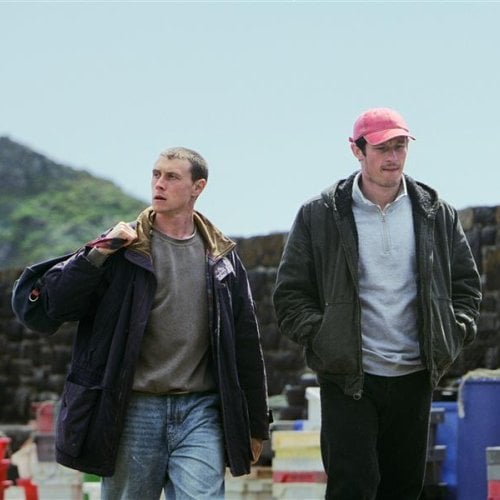
George MacKay and Callum Turner on the set of Rose of Nevada. © Ian Kingsnorth
Discover student-backed films
At Falmouth, Film BA(Hons) students don’t just study cinema - they help create it. From working alongside acclaimed director Mark Jenkin on his upcoming feature Rose of Nevada, starring Callum Turner and George MacKay, to gaining hands-on experience through the Sound/Image Cinema Lab, our students are immersed in the professional world of filmmaking from day one.
Explore the projectsStories from our community
Explore student projects, graduate successes, staff news and industry insights
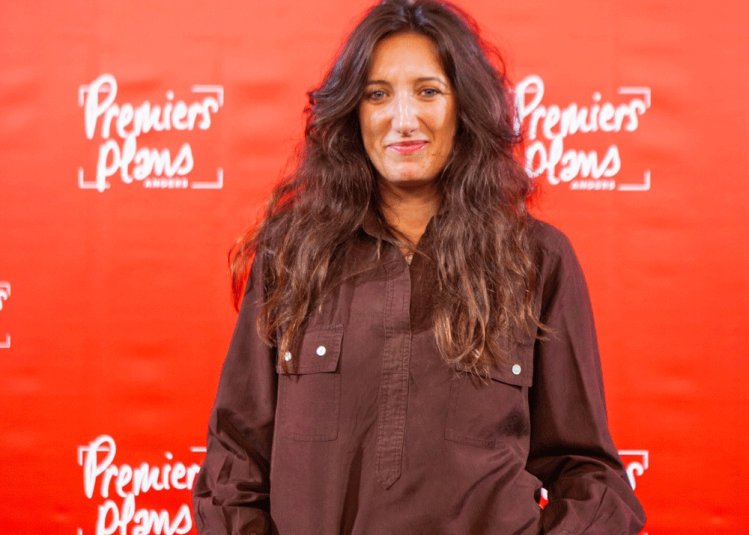
Film alumna and BAFTA winner takes her debut feature film to the festival circuit
17 February 2026
After seeing her film featured at Toronto International Film Festival, San Sebastián Film Festival ...
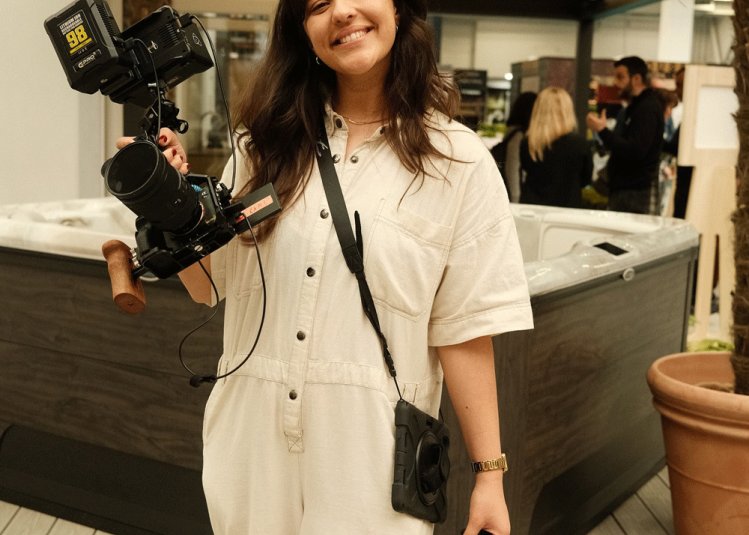
From film student to producer: Libby Gibbons reflects on the joy of working in commercial filmmaking
13 February 2026
Libby Gibbons has gone from studying both a BA(Hons) Film and MA Film & Television at Falmouth to wo...
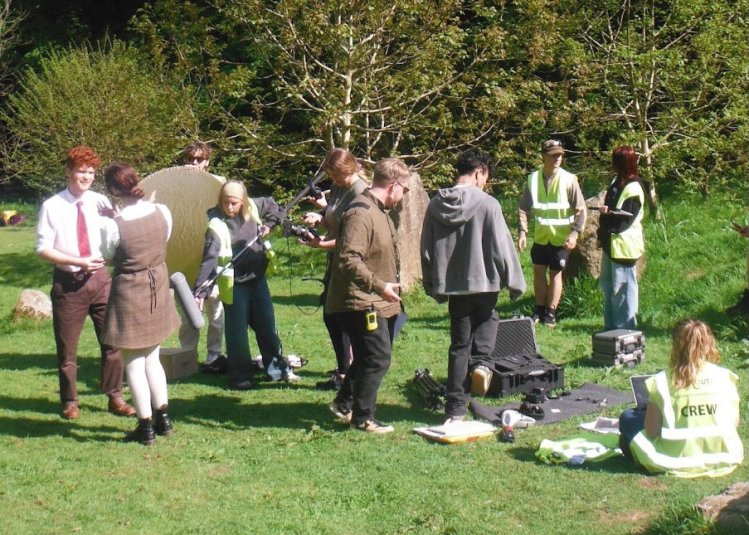
My experience of collaboration at Falmouth
02 February 2026
Alexandro explains how he collaborates with other students across the University.
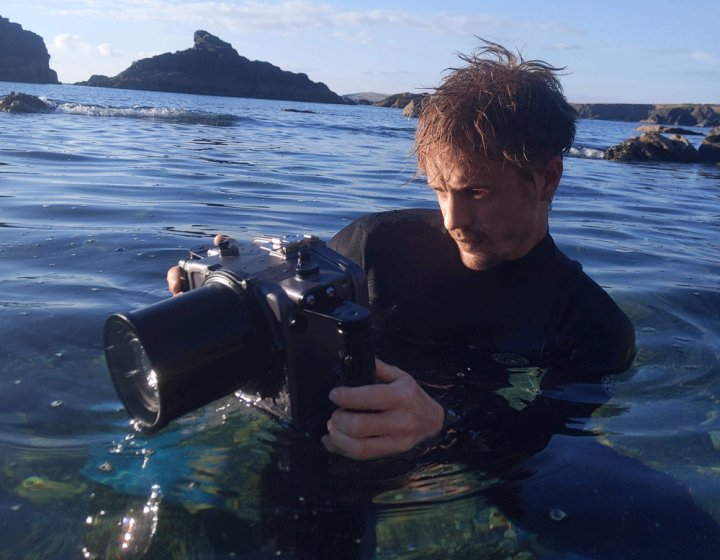
“Every day I am grateful this is my job”: film alumnus on creating visuals for outdoor lifestyle brands
20 January 2026
Sam Sherring’s career as a freelance filmmaker and photographer has led him towards filming conten...
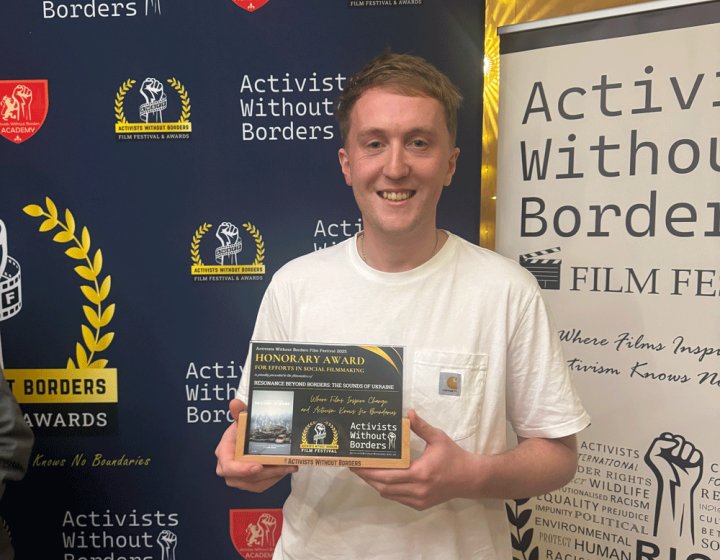
Television alumnus wins honorary award at Activists Without Borders Film Festival
05 December 2025
Since gaining his BA(Hons) Television & Film Production, Tom Waller has forged a career in filming, ...
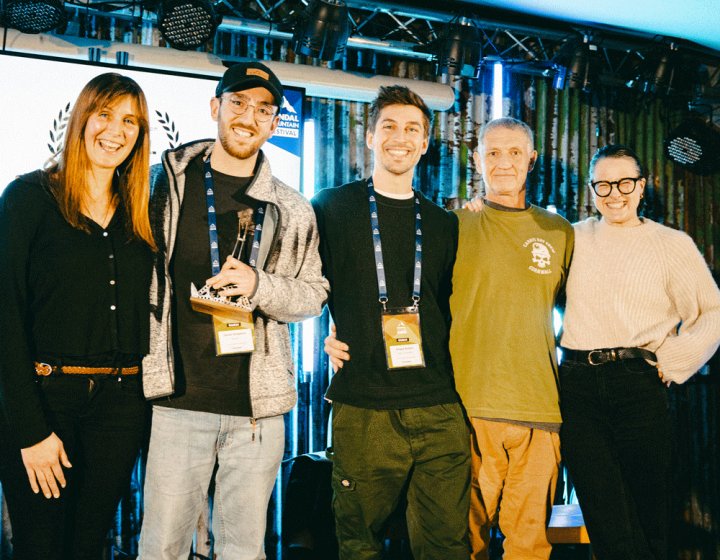
Film alumni take home award for Best Adventure at the Kendal Mountain Festival
02 December 2025
School of Film & Television alumni Dan Simpkins and Angus Breton, along with the rest of the creativ...

Creative Writing lecturer co-writes new horror film set in Cornwall
14 November 2025
Falmouth University’s Sound/Image Cinema Lab (S/ICL) and Creative Writing BA(Hons) lecturer, Craig...
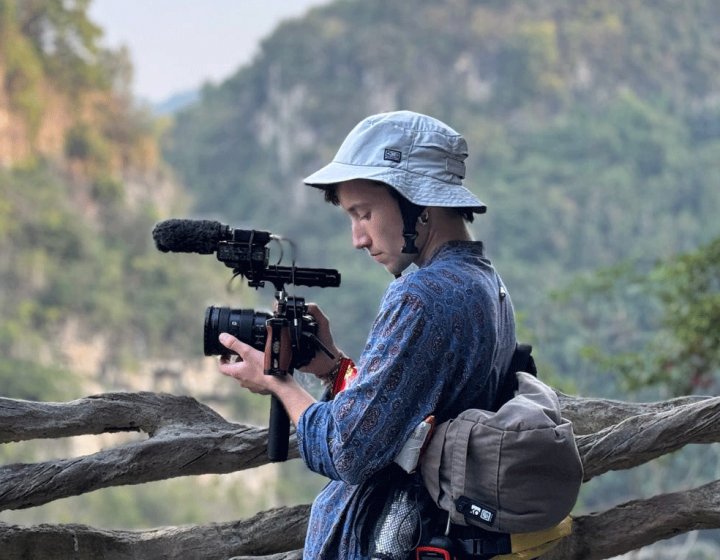
From Falmouth to filming in the Brazilian jungle: alumnus Nella Gocal-McConkey on working in TV
07 November 2025
Film BA(Hons) alumnus Nella Gocal-McConkey’s career path is an inspiring one: from working as a sh...
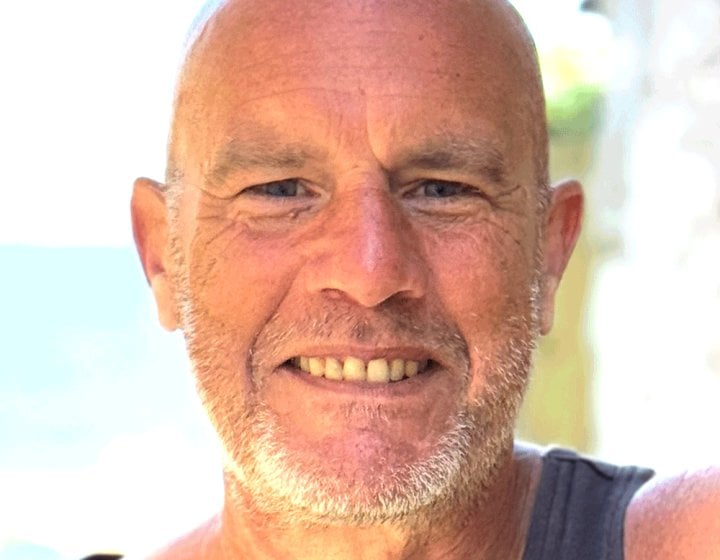
Film lecturer brings his award-winning documentary to Cornwall for its UK premiere
01 October 2025
After a summer of international success garnering accolades in India from Kookai International Film ...
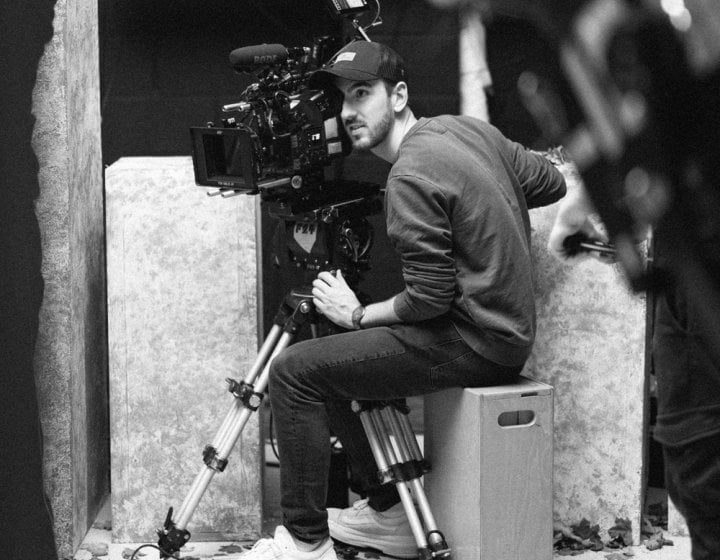
Film alumnus explores men’s mental health, mining and Cornwall’s community in new documentary
25 September 2025
Dan Simpkins is an award-winning documentary filmmaker and Director of Photography, who since gradua...
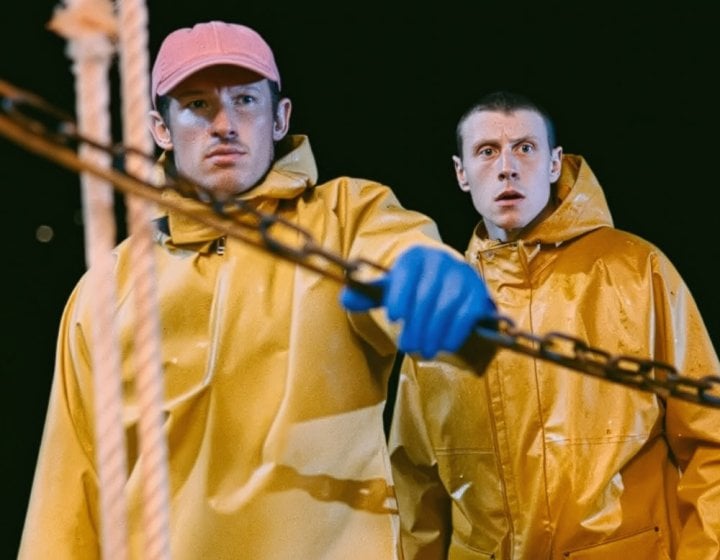
World premiere success for Falmouth’s Mark Jenkin at Venice
04 September 2025
Critics praise 'Rose of Nevada' for its bold aesthetic and powerful storytelling.
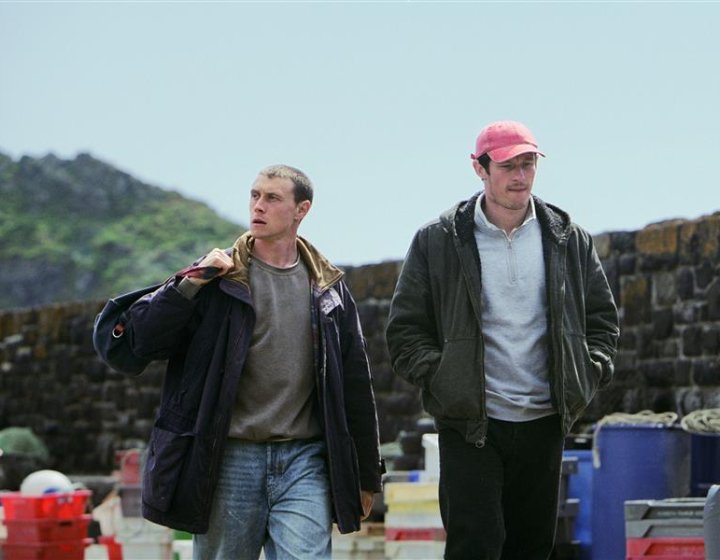
George MacKay and Callum Turner on the set of Rose of Nevada. © Ian Kingsnorth
Mark Jenkin’s Rose of Nevada to premiere at the Venice Film Festival
29 July 2025
'Rose of Nevada' will make its world premiere at the Venice Film Festival, screening in the Orizzont...
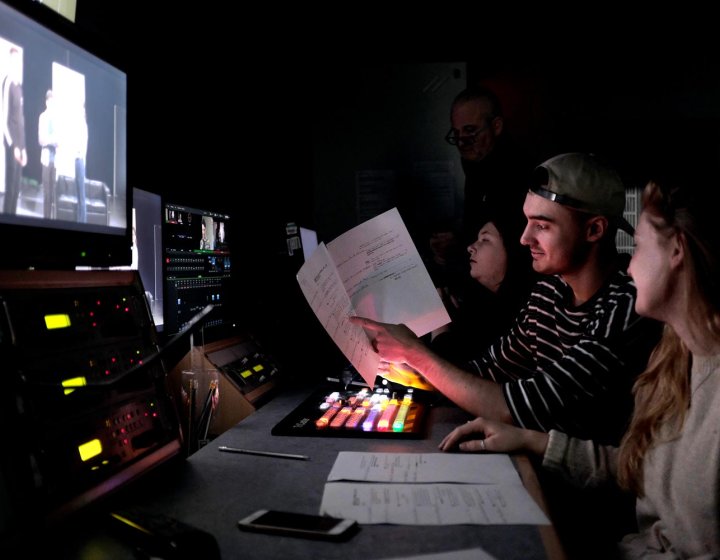
Choosing between Film BA and Television & Film Production BA at Falmouth
23 June 2025
Current student, Alex give a breakdown of the key differences between these two degrees.

George MacKay and Callum Turner on the set of Rose of Nevada. © Ian Kingsnorth
New student-backed films from Falmouth’s Sound/Image Cinema Lab
06 May 2025
Here’s a look at some of this year’s standout student-supported releases.
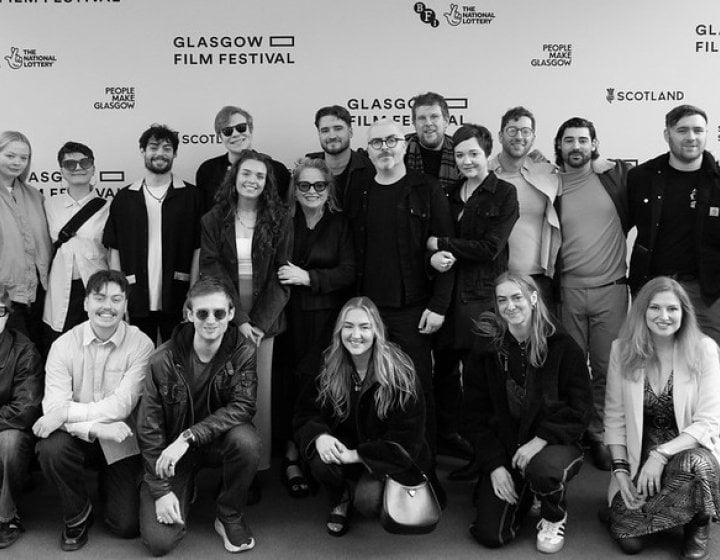
‘The Birdwatcher’ premieres at UK’s leading horror film festival
21 March 2025
Students from across Falmouth’s School of Film & Television, Fashion & Textiles Institute, and Gam...
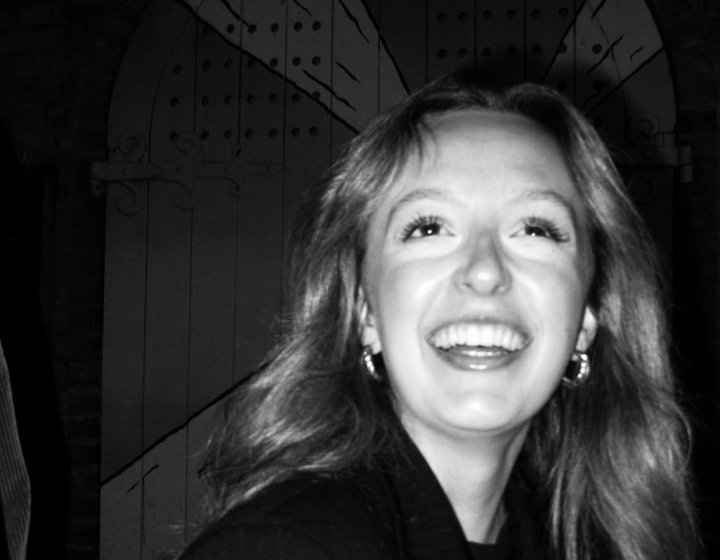
Film graduate brings Grenfell stories to life
20 December 2024
Film BA(Hons) graduate Lydia Knights has produced a compelling documentary film for the community fo...
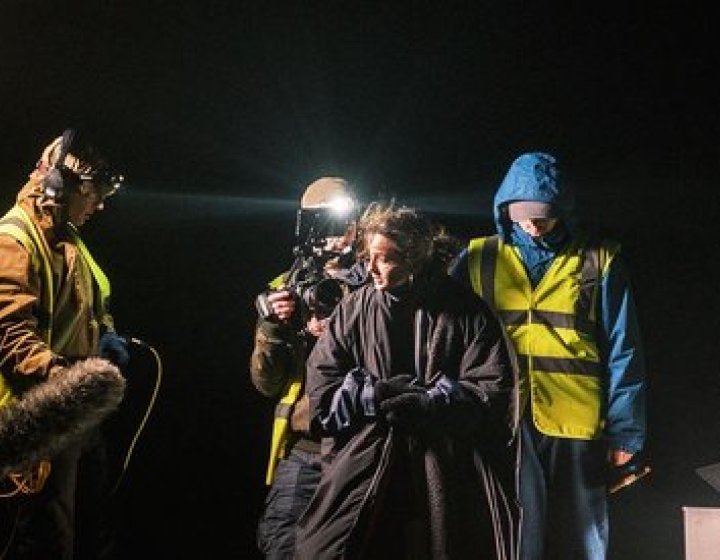
Collaborating at University: Creativity in Everything
09 December 2024
When people ask me to describe Falmouth University, I find no better way than to say a beautiful pla...
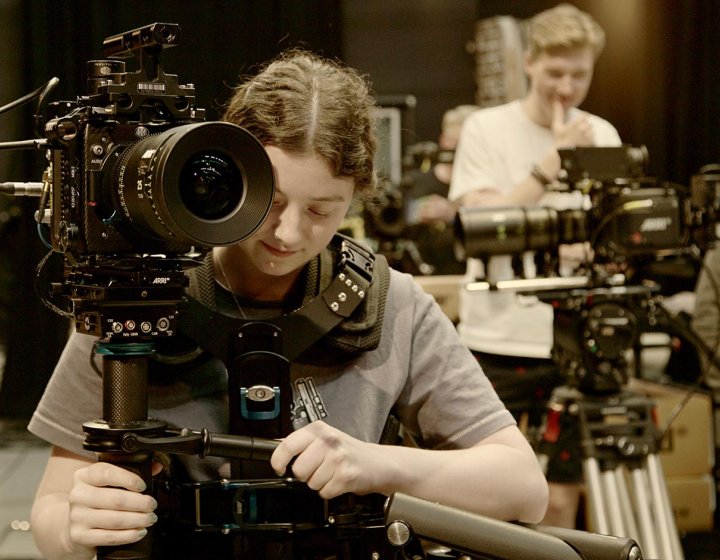
From script to screen: How to develop your film idea
25 November 2024
Get an insight into how the film production process works - from developing your initial idea to cra...
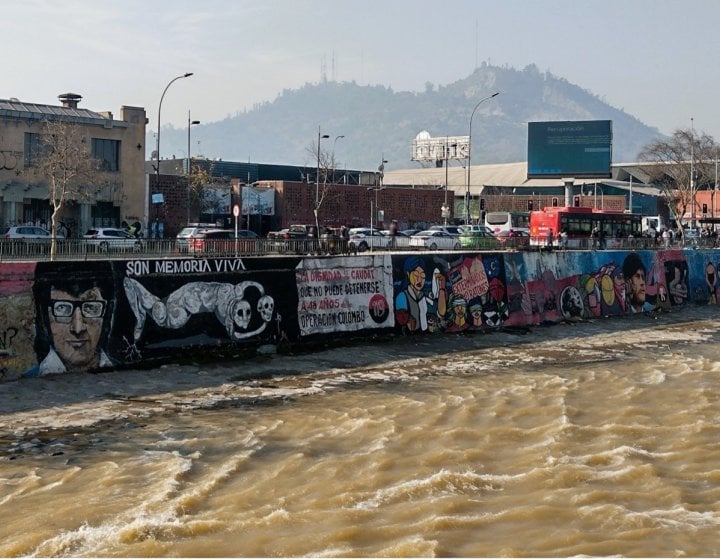
Where Memory Flows: BA Film’s Dr Struan Gray Conducts Research on Rivers as Spaces of Memory in Chile
03 October 2024
Dr Struan Gray, Senior Lecturer on BA Film, has recently returned from a research trip to Chile and ...
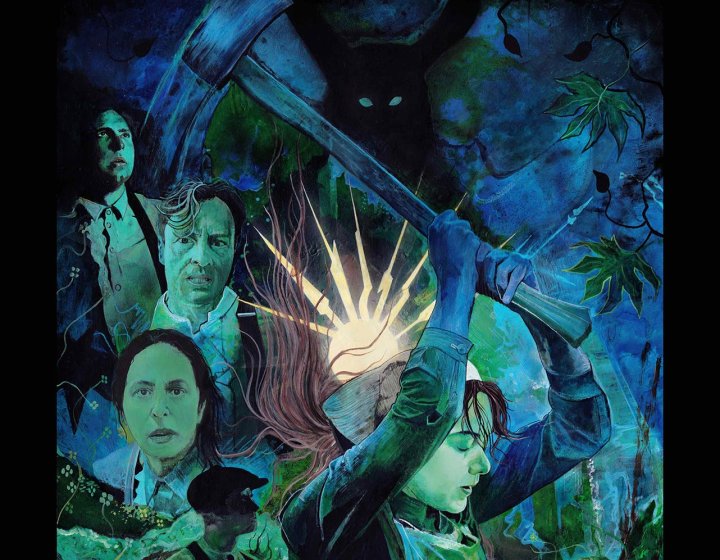
The Severed Sun set for world premiere at Fantastic Fest
19 September 2024
The Severed Sun, the debut feature film from director and Falmouth University lecturer, Dean Puckett...
Staff
You’ll learn from an experienced team of writers, academics and filmmakers, including experimental, short, narrative and documentary feature film directors, producers, cinematographers, editors, screenwriters, script editors, sound designers, editors, and art directors. Our technical and craft team includes specialists in lighting, cinematography and post-production picture editing and grade and sound editing and mixing.
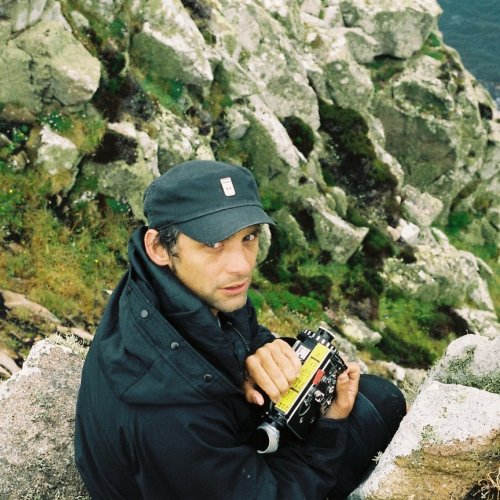
Mark Jenkin becomes Falmouth’s first Distinguished Professor
Mark Jenkin is a BAFTA award winning filmmaker who's worked at Falmouth University as an associate lecturer for over a decade - find out more about his new role.
Read moreSome members of staff only teach on specific modules, and your course might not feature every staff member who teaches on the course.
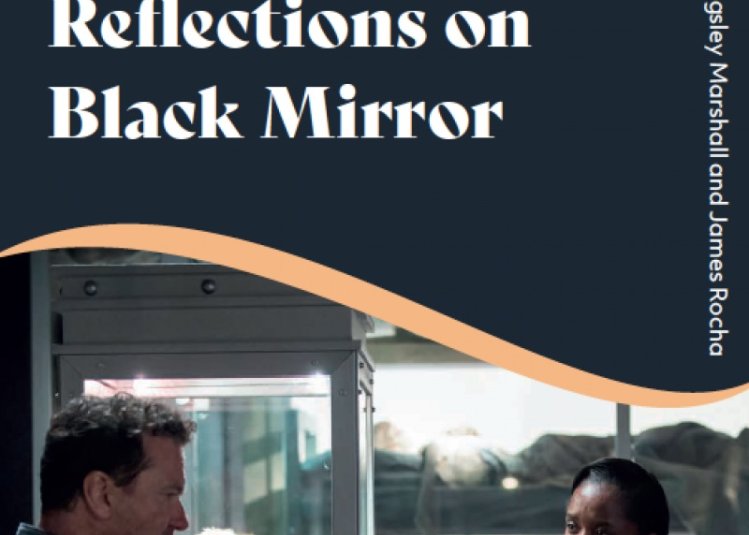
Dr Kingsley Marshall
Head of Film & Television
Dr Kingsley Marshall is Head of the CILECT and ScreenSkills accredited School of Film and Television...
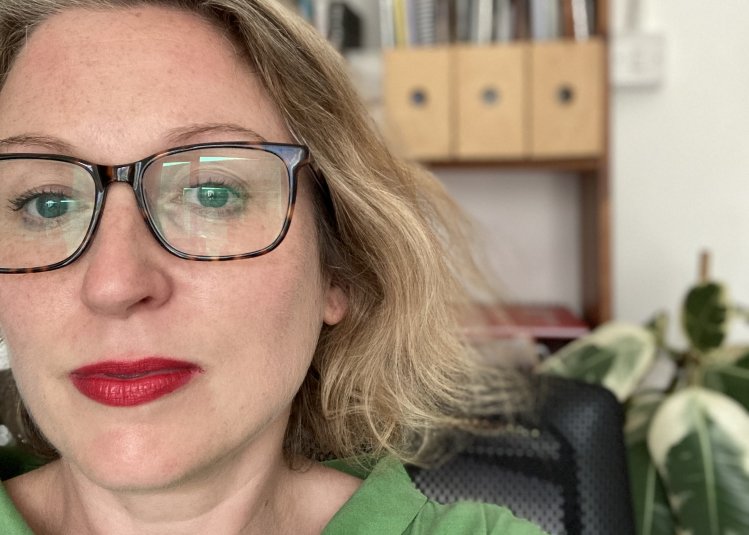
Dr Laura Canning
Course Leader, BA(Hons) Film
Laura is a filmmaker and academic where she is Course Leader for the BA (Hons) Film, running final y...
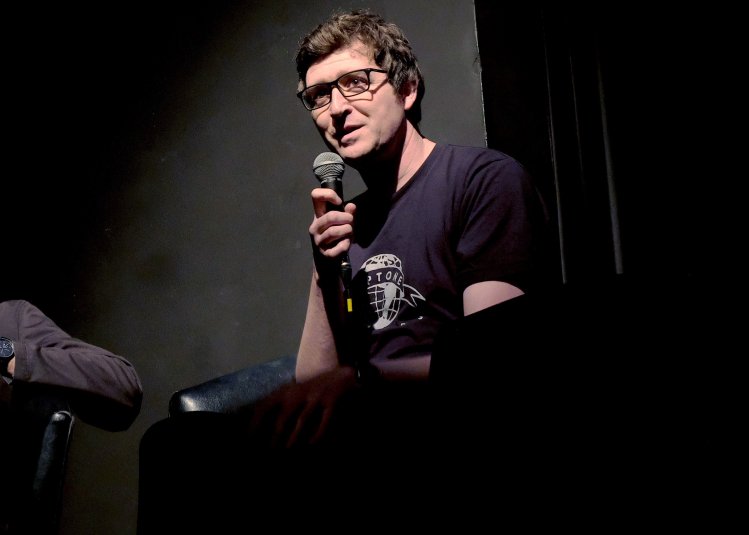
Professor Neil Fox
Professor of Film Practice and Pedagogy
As a proud first-generation university graduate from a working-class background in Luton, it is an h...
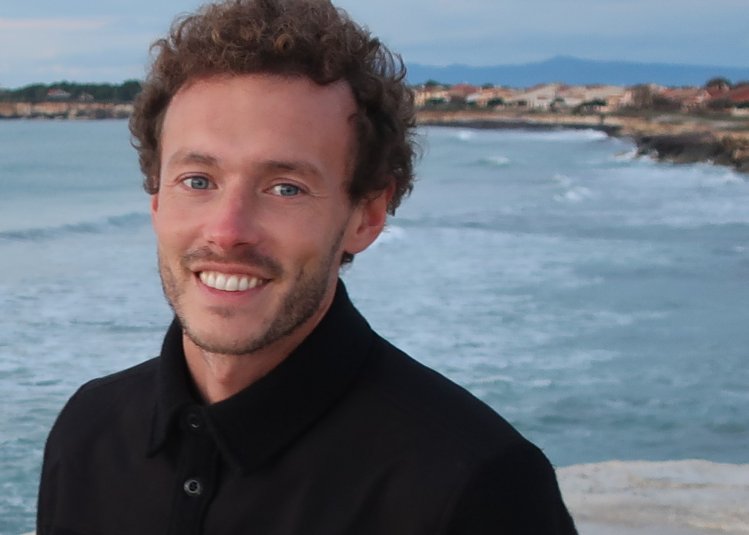
Dr Struan Gray
Senior Lecturer, Film BA(Hons)
Struan Gray is a senior lecturer in the School of Film and Television at Falmouth University, teachi...
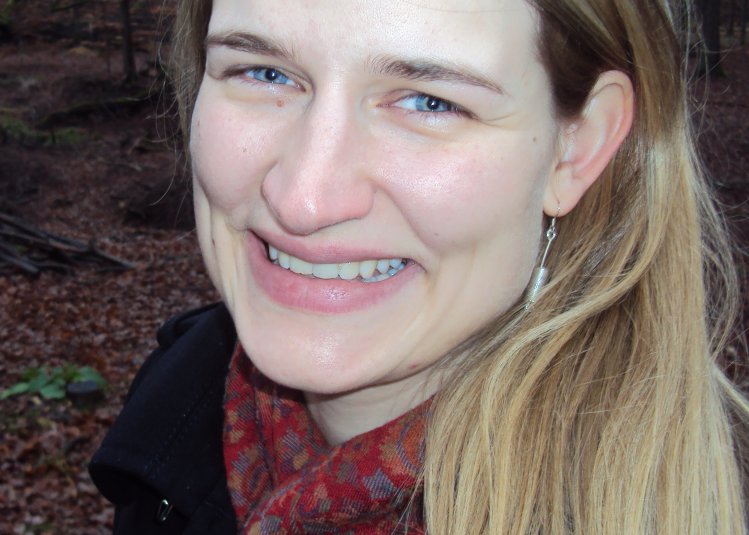
Dr Verena Von Eicken
Lecturer
Verena von Eicken is a lecturer at the School of Film & Television. She was awarded her PhD in T...
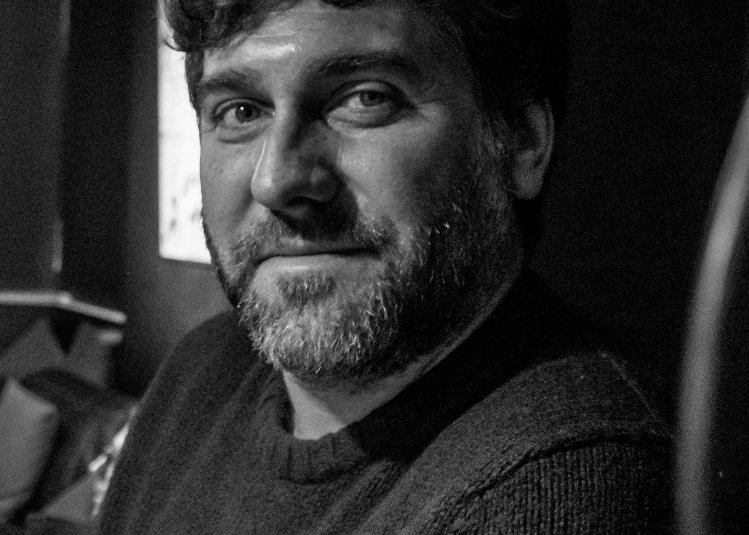
Paul Mulraney
Lecturer, Film
Paul is a lecturer in the School of Film and Television, teaching general film practice across all l...
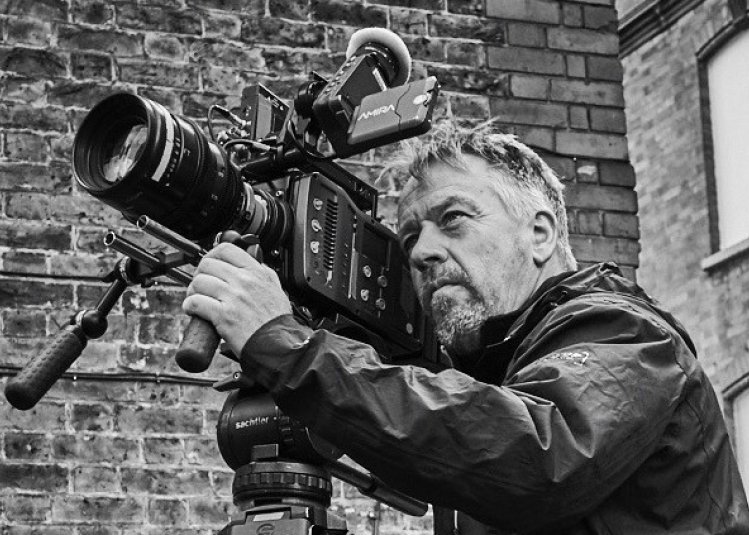
Nick Manley
Lecturer
Nick has worked worldwide in the industry for over 30 years as an award winning documentary ca...
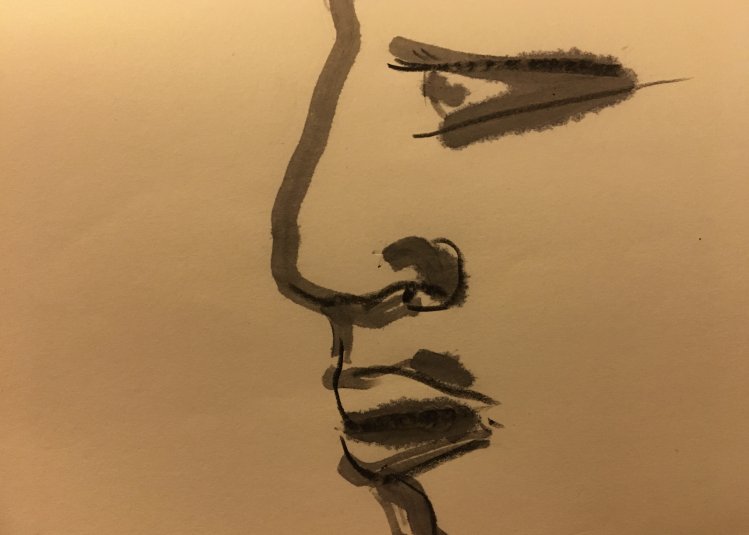
Caroline Deeds
Lecturer in Documentary and Factual Television
Caroline has a background as a fine artist. She studied at Glasgow School of Art and then Centr...
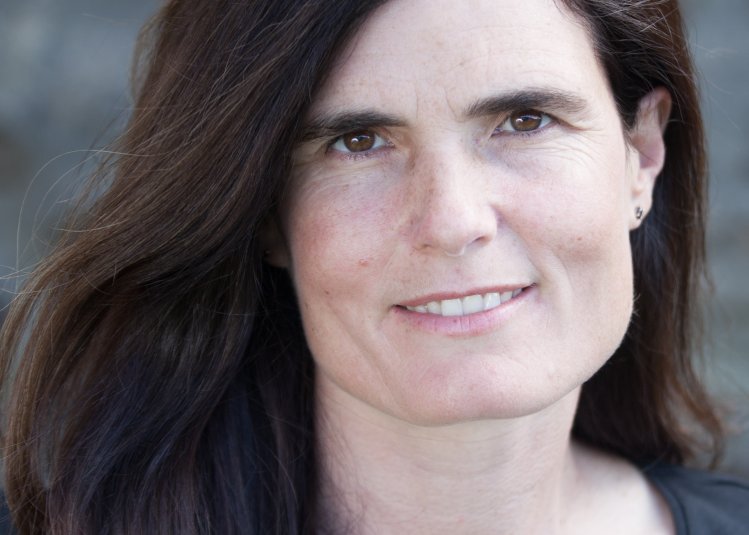
Charlie Fripp
Senior Lecturer, Television
Charlie is a Senior Lecturer at the School of Film and Television. Charlie is a former BBC journalis...
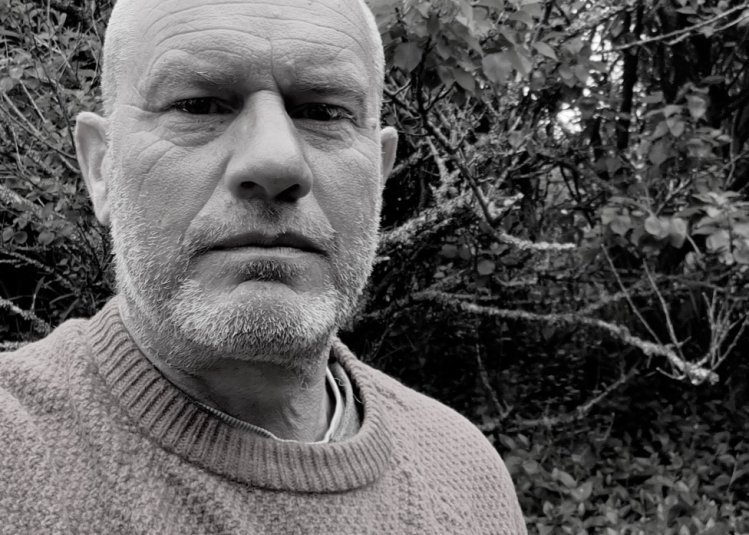
Dr Julian Konczak
Lecturer
Following a career in production as a post-production freelance, I have taught a range of modules in...
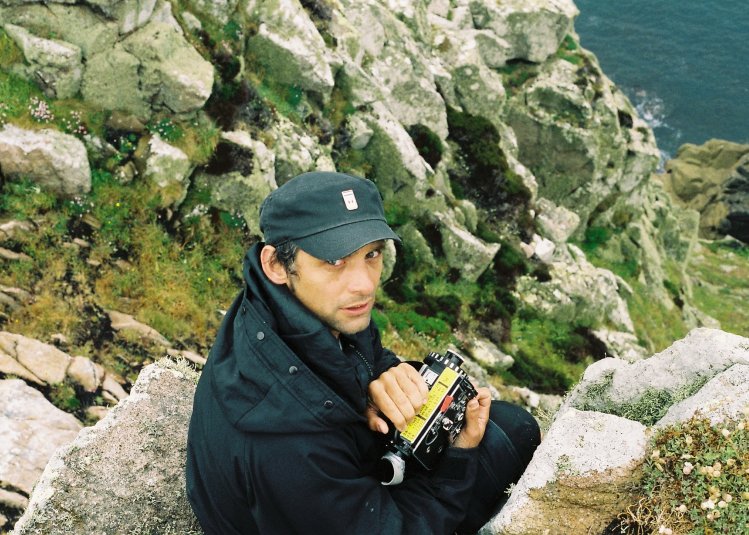
Mark Jenkin
Distinguished Professor of Film Practice at Falmouth University
Distinguished Professor of Film Practice Mark Jenkin is a filmmaker based in West Cornwall. He ha...
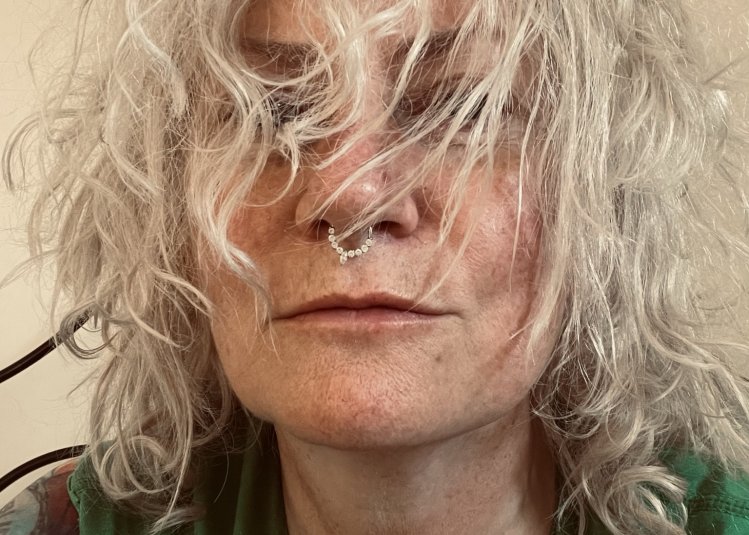
Dr Kat Flint-Nicol
Senior Lecturer, Film & Television
Kat is a Senior Lecturer in Film and joined Falmouth in the summer of 2023, having taught at Queen's...
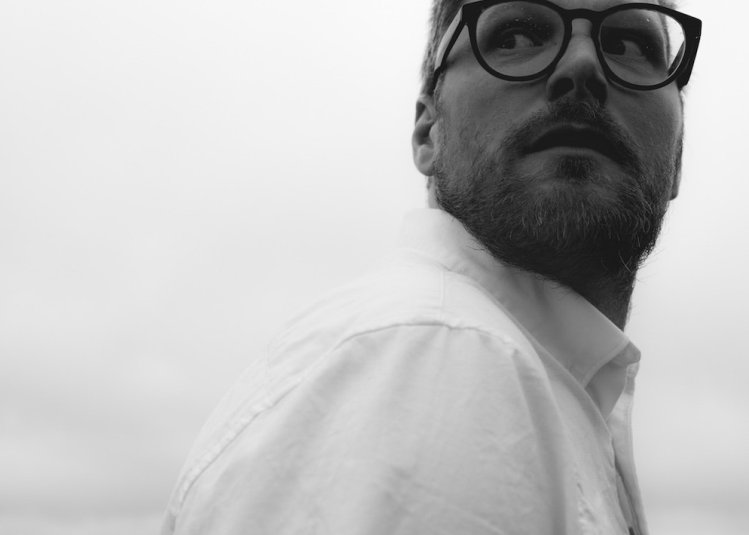
Dean Puckett
Lecturer
Dean Puckett is a writer/ director and film lecturer at Falmouth University in Cornwall. He recen...
Careers
Falmouth Film graduates have worked in the development and production of short and feature films, commercials and major television series, with credits including Deadpool 3, House of the Dragon, Star Wars, Mission: Impossible and Bond franchises, Blade Runner 2049, Alice Through the Looking Glass, Squid Game, and The Great British Bake Off.
Our 20 years of alumni work in production at Warner Bros, Sony, Disney and Universal, and post-production at Halo, The Mill, DNEG, Envy, Technicolor, White House Post, Molinare and Evolution. They’ve secured roles in production design at Lucasfilm, and in the camera department for shows screened on the Discovery Channel, and the BBC.
Our graduates’ work has been featured at BAFTA, BIFA and Academy Award qualifying festivals, secured development from the BFI and BAFTA, and been published in titles including Total Film, The Telegraph, The Guardian and Little White Lies.
Student placements have included NBC/Universal Pictures Hothouse, Envy Academy, Sky, Cannes Film Festival, Mammoth Film, Gorton Studies, Wall to Wall, Big Talk, MTV, BBC, E4 and Channel 4.
We’ve also produced a slate of films through the Sound/Image Cinema Lab, our in-house production centre, including Rose of Nevada (2025), The Severed Sun (2024), Enys Men (2023), A Year in a Field (2023), Long Way Back (2022), Wilderness (2021), Bait (2019), shorts including and The Birdwatcher (2023), Bloom (2023), Mab Hudel (2022), Kestav (2020), Hard Cracked the Wind (2019) and Backwoods (2019).
What can I do with a Film degree?
If you have aspirations of becoming a screenwriter, producer, director or animator then a degree in Film, Television or Animation provides the foundations for a career in cinema.
How to apply
Ready to apply for 2026?
You can apply for our undergraduate degrees via UCAS. You'll need our university UCAS code (F33) as well as your course code (which you'll find on your course page) for your application.
Applying as an international student?
There are a number of different ways to apply to study at Falmouth as an international student. Find out how you can become part of our creative community.
| Course route | UCAS code |
|---|---|
| Film BA(Hons) three year degree | W610 |
| Film BA(Hons) with Integrated Foundation Year | FY24 |
| Film BA(Hons) with professional placement | PY54 |

Application advice & interview information
Go to ToolkitFor starting your studies in 2026
UK applications: 14 January 2026 (for equal consideration)
Applications after the 14 January will be considered on a first-come, first-served as long as there are places available. Apply for this course now.
For starting your studies in 2027
UK applications: 13 January 2027 (for equal consideration)
International fee payers
International fee payers can apply throughout the year. But we recommend applying as early as possible, to make time for visa and travel arrangements.
We consider all applications on their own individual merit and potential.
Our diverse community is creative, innovative and entrepreneurial. We recognise that these qualities aren’t always shown in academic grades alone. That’s why, while many of our applicants achieve high academic grades, we also welcome those who can demonstrate their potential through an interview.
We welcome applications from all subject backgrounds, whether you’ve specialised in STEM, the arts or humanities. Find out more about our Entry Requirements here.
Course routes & entry requirements
BA/BSc(Hons) three year degree: minimum 96 UCAS Tariff points
BA/BSc(Hons) four year degree with professional placement: minimum 96 UCAS Tariff points
BA/BSc(Hons) four year degree with Integrated Foundation Year: minimum 64 UCAS Tariff points
At Falmouth, we'll consider the equivalency of your specific qualifications against our entry requirements and support you through your application journey.
View our International Entry Requirements
Language requirements
For applicants whose first language is English we require you to have or be working towards GCSE English Language Grade 4 (C), or equivalent.
If English is not your first language you will need to meet the same standard which is equivalent to the IELTS Academic 6.0 overall score, with at least 5.5 in Reading, Writing, Speaking and Listening. We accept a range of in country equivalencies and approved tests.
If you need a student visa to study in the UK, you may need to take a recognised language test. You can read our English Language Requirements for more information.
What we're looking for
We want someone who:
- Can identify what led them to apply.
- Understands film’s cultural and historical contexts.
- Can develop their potential in communication.
- Can self-motivate, work well in a team and never give up.
Fees, costs & funding
Tuition fees
| Annual tuition fee | Student |
|---|---|
| £9,790 per year | Full-time UK |
| £19,950 per year | Full-time EU/international |
| £1,955 per professional placement year | Full-time UK and EU/international |
| £9,790 per Integrated Foundation Year | Full-time UK |
| £19,950 per Integrated Foundation Year | Full-time EU/international |
| Annual tuition fee | Student |
|---|---|
| £9,535 per year | Full-time UK |
| £17,950 per year | Full-time EU/international |
| £1,905 per professional placement year | Full-time UK and EU/international |
| £9,535 per Integrated Foundation Year | Full-time UK |
| £17,950 per Integrated Foundation Year | Full-time EU/international |
Tuition fees for September 2027 will be confirmed in summer 2026.
Tuition fees are set annually and are subject to review each year. The University may therefore raise tuition fees in the second or subsequent years of a course, in line with inflation and/or the maximum permitted by law or Government policy. Students will be notified of any changes as soon as possible.
The figures above don't include accommodation and living costs
Typical course costs
Recurring annual costs
- £50 - Optional study visits and placements
One-off costs for the duration of the course
- £50 - materials
Optional study trips
- £700 - Optional study visit to Berlinale Film Festival
- £50 - Optional study visits and placements
If you need to bring equipment or materials with you, these will be outlined in your Welcome Letter.
Technology
A laptop will be an essential piece of equipment along with a reliable broadband connection (if you are living in University accommodation you will have this). You can expect to pay £200-£300 to purchase a basic one for email and word processing. You will also need access to a camera phone. You may wish to consider buying a laptop which can connect to an add-on DVD player (see our ‘Platforms and screenings’ section below) – these can be found for anywhere between £20 and £100.
Please bear in mind that film editing requires high powered computing which will be best achieved using our industry standard editing computers so you definitely don’t need to splash out on anything high spec. Similarly, hard drives can be borrowed from our Stores, but if you do prefer to have access to your own (to store and backup your film work) reliability is critical – we recommend brands such as G-Tech or Lacie with USB 3 connectivity and ideally a minimum disk speed of 7200rpm (approx. £100).
We are an AVID-accredited course, which means that you may (particularly if you are interested in working in post-production) wish to sign up for our Pro Tools or Media Composer Certification courses. Tuition for these is free, but you will pay a fee to AVID for the exam, which also covers the ebooks they provide for your training. This fee is set by AVID directly and should be estimated at around £80 per module.
Platforms and screenings
As a member of the BA Film course you’re going to spend a lot of time in our Cinema (129-seat, 7.2 surround sound with Christie M Series HD projection, just like in Vue cinemas – but we don’t like to boast) and we have over 8,600 DVDs and Blu-rays in our library as well as a range of streamed options. Remember some gaming consoles can also play DVDs/BluRays, if you’re thinking of bringing yours along. You should consider budgeting for regular cinema trips and if you’re looking at subscribing to a streamer, the best one is MUBI – they do a free 30-day trial and a student rate.
Study trips
Trips aren’t mandatory but over the past few years, in most years we’ve been able to offer students the opportunity to travel to a major international film festival (usually the Berlin Film Festival) as part of a group of students. Places are not funded and the cost as last estimated for travel in 23-24 was between £710 and £775 (depends on the number of students travelling, and the rate of exchange at the time).
Students may travel to one or more of the Royal Television Society Breaking Into Media events over the course of their degree, which are often held in Bristol or Plymouth – these are free but you may wish to consider the cost of bus or train transport to them, and potentially overnight accommodation.
You must make sure that you have sturdy (essential for on-set safety) waterproof shoes or boots, and a selection of warm and waterproof clothing appropriate for wet weather – shooting on location in Cornwall can be a damp affair!
Additional typical course costs for Integrated Foundation Year pathway
- £250 for materials
- A laptop/desktop computer
- Adobe Creative Suite
To engage in the digital learning activity, although you will be able to access IT suites on campus, you will benefit from a laptop to access the platforms and tools we use. Depending on your subject, you may need a specific type of computer. If you're unsure about what you might need, please contact our course advisors.
Laptop (essential)
There is excellent access to computers at Falmouth, both PC and Mac, but you will also need your own laptop and a reliable internet connection to access the digital platforms we will be using for online activities as well as your independent and group-based work.
You can expect to pay £200-£300 to purchase a basic one for email and word processing. Video editing requires high powered computing which for most will be best achieved using our industry standard editing computers.
Smartphone
Even the most basic smartphone with a working camera will be sufficient for you to experiment with expressing yourself and developing your narrative storytelling to supplement the use of the bookable resources.
Hard Drive
Hard drives can be borrowed from our Stores however it’s often handy to have access to your own to store and backup your work. Reliability is critical so we would recommend brands such as G-Tech or Lacie with USB 3 connectivity and ideally a minimum disk speed of 7200rpm (approx. £100).
Clothing
You will be expected to work in all sorts of locations and weather conditions. It is therefore highly recommended that you come fully prepared with the right sort of personal clothing to protect yourself from the elements and to meet risk assessment requirements. This will set you up well for industry work beyond graduation too.
This list is not exclusive, so please use it as a guide; you should be able to equip yourself for the outdoors for approximately £150 (some companies offer student discounts so be sure to check):
- Waterproof jacket
- Warm headgear
- Strong waterproof boots/shoes
- Gloves
- Waterproof trousers (working all day in wet jeans is particularly unpleasant!)
- Warm/thermal top (and bottoms for good measure!)
- Mobile phone for emergencies
Typical Costs
Typical course material costs:
- £150 - Recurring annual costs may include printing and stationary.
Study trips:
There are several Integrated Foundation Year field trips, and you will need to allow for some costs for student contributions towards coach hire and exhibition entry. Total annual cost of day trips approximately £60.
If you want to attend the planned IFY week-long residential trip to London in the Spring of 2026 then you will need to plan for a £100 deposit payment shortly after arriving on the course, to secure a place, and to budget for a total trip cost of approx. £400 - to be paid in instalments.
Funding
For information about funding available, please visit our student funding pages.
Ask a student
What better way to find out about life at Falmouth University than by asking our current students?
From course details and academic support, to the social scene and settling in, our students are ready and available to answer any questions you might have. Simply set up your account, send them a question and they'll get back to you within 24 hours.
Similar courses
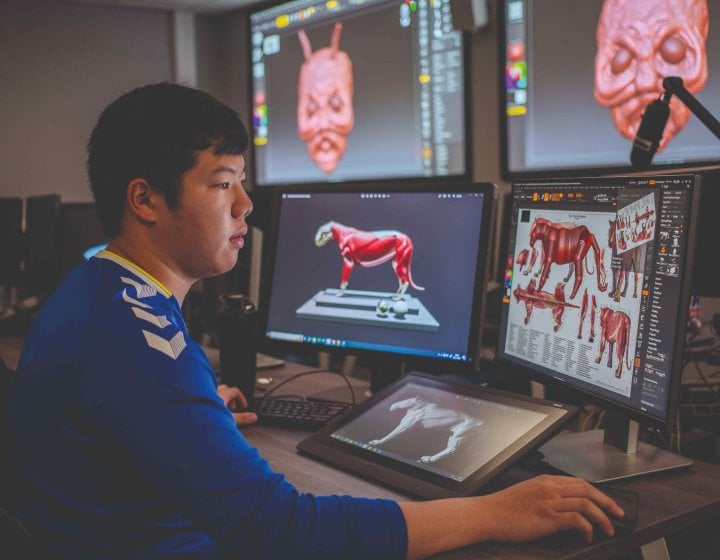
Post Production & Visual Effects BA(Hons)
Take your first steps in building a career on this industry-focused course, which covers all aspects...
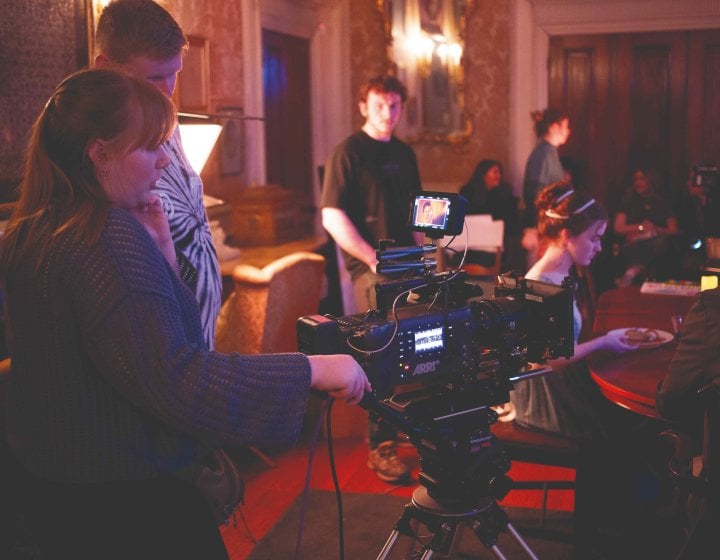
Television & Film Production BA(Hons)
Discover how to create everything from high-end dramas with full scale crews through to fast moving ...
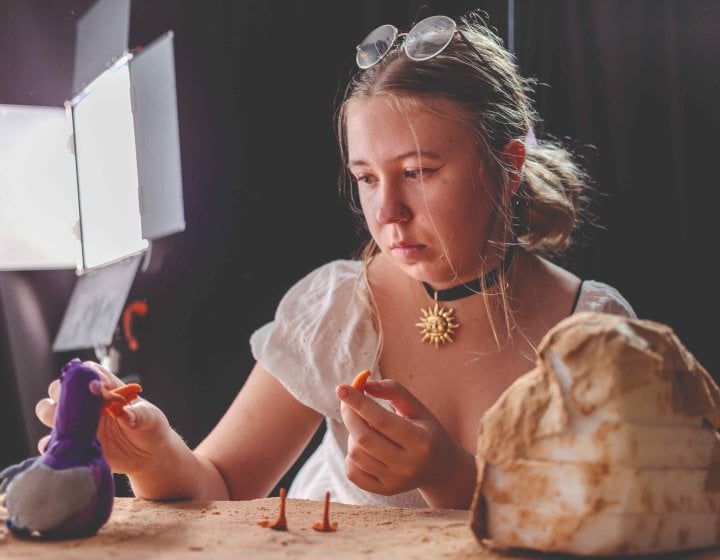
Animation BA(Hons)
Bring your ideas to life through the world of animation. We’ll support you in developing original,...
Open Days and events
From visiting campus to online application advice, get all the information you need about joining our creative community.
Find an event

